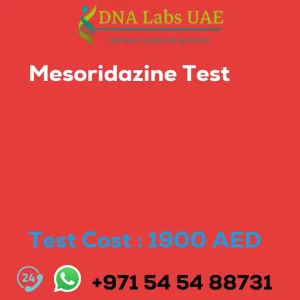FLT3ITD Allelic Ratio Test
Test Name: FLT3ITD Allelic Ratio Test
Components: EDTA Vacutainer (2ml)
Price: 1520.0 AED
Sample Condition: Bone marrow / Peripheral blood (Transport immediately)
Report Delivery: 8-10 days
Method: Fragment Analysis
Test type: Genetics
Doctor: Gynecologist
Test Department: Pre Test Information
Pre Test Information: FLT3/ITD Allelic Ratio can be done with a Doctor’s prescription. Prescription is not applicable for surgery and pregnancy cases or people planning to travel abroad.
Test Details
The FLT3/ITD allelic ratio is a measurement used to determine the ratio of mutant FLT3 gene copies to normal FLT3 gene copies in a patient’s blood or bone marrow sample. FLT3/ITD refers to an internal tandem duplication mutation in the FLT3 gene, which is commonly found in acute myeloid leukemia (AML) and is associated with a poor prognosis.
The allelic ratio is calculated by dividing the peak height or area of the mutant FLT3 allele by the peak height or area of the normal FLT3 allele. This ratio provides important information about the burden of the FLT3/ITD mutation in the patient’s leukemia cells.
A higher allelic ratio indicates a higher proportion of mutant FLT3 gene copies, which is generally associated with a worse prognosis and a higher risk of relapse in AML patients. Monitoring the FLT3/ITD allelic ratio over time can help assess the response to treatment and detect minimal residual disease in AML patients.
| Test Name | FLT3ITD Allelic Ratio Test |
|---|---|
| Components | EDTA Vacutainer (2ml) |
| Price | 1520.0 AED |
| Sample Condition | Bone marrow \/ Peripheral blood (Transport immediately) |
| Report Delivery | 8-10 days |
| Method | Fragment Analysis |
| Test type | Genetics |
| Doctor | Gynecologist |
| Test Department: | |
| Pre Test Information | FLT3/ITD Allelic Ratio can be done with a Doctors prescription. Prescription is not applicable for surgery and pregnancy cases or people planing to travel abroad. |
| Test Details |
The FLT3/ITD allelic ratio is a measurement used to determine the ratio of mutant FLT3 gene copies to normal FLT3 gene copies in a patient’s blood or bone marrow sample. FLT3/ITD refers to an internal tandem duplication mutation in the FLT3 gene, which is commonly found in acute myeloid leukemia (AML) and is associated with a poor prognosis. The allelic ratio is calculated by dividing the peak height or area of the mutant FLT3 allele by the peak height or area of the normal FLT3 allele. This ratio provides important information about the burden of the FLT3/ITD mutation in the patient’s leukemia cells. A higher allelic ratio indicates a higher proportion of mutant FLT3 gene copies, which is generally associated with a worse prognosis and a higher risk of relapse in AML patients. Monitoring the FLT3/ITD allelic ratio over time can help assess the response to treatment and detect minimal residual disease in AML patients. |








